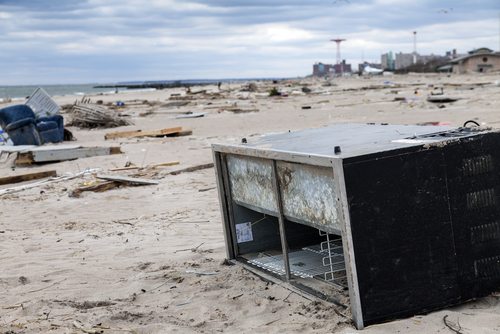
January 1, 2013; Source: Politico
Last week as many Americans were wondering what would happen with fiscal cliff negotiations, the Senate approved a $60.4 billion aid package to support recovery efforts following hurricane Sandy but, much to the distress of those representing those districts, the House has now adjourned its legislative session without taking up the Bill. This stunned some legislators who were fully expecting the bill to be debated today.
“I can’t remember a time when we had a very serious storm, tornado, fire, flood where we did not act,” said House Minority Whip Steny Hoyer (D-Md.) “This Congress is apparently leaving town without responding to that emergency. There’s not one of us, not one of us in this Congress that could not be in the same position.
Sign up for our free newsletters
Subscribe to NPQ's newsletters to have our top stories delivered directly to your inbox.
By signing up, you agree to our privacy policy and terms of use, and to receive messages from NPQ and our partners.
“There are Republicans who are deeply grieved by this action and there are Democrats on this Floor who are deeply grieved by this action. This is not the right thing to do. I would hope it would be reconsidered.”
A representative for House Speaker John Boehner has said that he is committed to passing an emergency bill this month when congress reconvenes but it will have to start from scratch.
According to the AP, the Democratic-led legislation passed the Senate on a 62-32 vote with 12 Republicans supporting the bill. Recipients of this federal funding are as far-ranging as FEMA, the Army Corps of Engineers, the U.S. Government’s flood insurance program, and New York City’s Subways system. Although a major point of contention between parties has been the timeframe for relief funding, AP points out that “$47.4 billion — is for immediate help for victims and other recovery and rebuilding efforts.” Highlighting the urgent need for the provisions established in the Bill, Sens. Barbara Mikulski, D-MD, the Senate Appropriations Chair, told the AP, “It will actually put people to work in their own communities, rebuilding their own communities.”
Because the House did not vote on the Bill this week the process will have to start over with a new session of congress. Even before the adjournment, the AP pointed out that in its next phase in the House, the Bill “faces uncertain prospects” with Republican leaders. As a hint of the difference in process that might be to come, House Appropriations Chairman, Harold Rogers, Republican from Kentucky’s 5th District, told Michael Powell of the New York Times in a recent column, “That’s the Senate; they do their thing.” Rogers added, “We are scrubbing the numbers, looking at the justifications, being sure we are dealing with the results of the hurricane and not other causes.” Still, Powell’s own status as a New York resident gives him a clear-eyed view of his surroundings that some congressional leaders might lack. He observes, “Whatever. In my city, in my region, the musty whiff of disaster hangs heavy, and our politicians talk of keeping neighborhoods whole.”
The delay in federal funding has meant that some organizations have taken on impromptu role of relief providers. In another recent story story the New York Times profiled the work of the Ocean Bay Community Center in Queens, which has stepped into the role of food pantry for families and the elderly–with donations coming from as far aways as Japan and Norway. According to the Times, a year-end letter to the Center from the New York Housing Authority to cease relief efforts and transfer supplies to city agencies might add more confusion to an already complex process.—Anne Eigeman











